Oral Health Program: Information for Health Care Professionals
This webpage provides professionals with information about oral health and resources to share with patients. Members of the general public can find information and resources on our Information for All webpage.

Infection prevention and control resources available
Check out the CDC (Centers for Disease Control and Prevention) infection prevention and control resources for dental professionals:
- Foundations: Building the Safest Dental Visit training
- DentalCheck mobile app
- Summary of Infection Prevention Practices in Dental Settings: Basic Expectations for Safe Care
Make sure you submit your Foundations training certificate (PDF) to the Oral Health Program via online survey!
Resources
Explore each section below to locate the information you find most helpful.
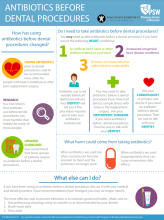
Antibiotics Before Dental Procedures, P-01966 (PDF) Department of Health Services (DHS) publication: Information for patients about taking Antibiotics Before Dental Procedures.
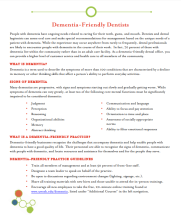
Dementia-Friendly Dentists, P-01269a (PDF) DHS publication: Information on the changing oral health care needs of people living with dementia, how dementia-friendly dentists can help and access resources.
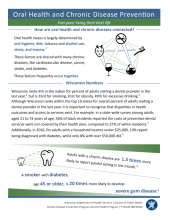
Oral Health and Chronic Disease, P-02106 (PDF) DHS publication: Information on the connection between Oral Health and Chronic Disease, offers tips and resources for prevention.
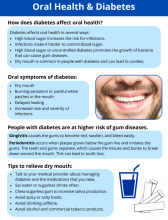
Oral Health and Diabetes, P-00140 (PDF) DHS publication: Explains the relationship between diabetes and oral health. Learn oral symptoms of diabetes, tips for maintaining a healthy mouth, and some Wisconsin specific facts on oral health and diabetes.
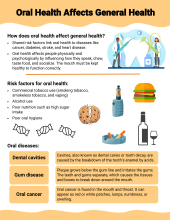
Oral Health Affects General Health, P-00159 (PDF) DHS publication: Explains the relationship between general health and oral health. Learn about oral diseases, tips for improving oral health, and some Wisconsin specific facts.
Other resources
- Adult Oral Health National Institute of Dental and Craniofacial Research (NIDCR), English-Spanish: Information for patients and caregivers on adult oral health topics. Learn more about diabetes and oral health, dry mouth, burning mouth syndrome, and temporomandibular disorders. Download or order free printed copies of publications.
- American Association of Public Health Dentistry American Association of Public Health Dentistry: Aims to improve total health for all through the development and support of effective programs of oral health promotion and disease prevention.
- MouthHealthy American Dental Association (ADA): Learn more about dental health topics A-Z, Download how to brush patient education sheet, and& share how to videos for brushing and flossing with patients.
- Publications for Consumers National Maternal and Child Oral Health Resource Center: Find educational materials for consumers in English and other languages. Materials are easy to read for all audiences.
- Smiles for Life Oral Health Smiles for Life, English- Spanish: A national oral health curriculum. *Download patient tools and resources and patient education posters in multiple languages.

Antibiotics Before Dental Procedures, P-01966 (PDF)
DHS publication: Information for patients about taking Antibiotics Before Dental Procedures.
Other resources
- Antimicrobial Stewardship: Dental DHS: The scope of antibiotic prescribing and use in the dental setting makes it an ongoing area of focus for antibiotic use tracking and evidence-based prescribing reduction. Visit this page to find guidance, resources, and printable materials for dental professionals.
- Antibiotic Stewardship for Oral Health Organization for Safety, Asepsis and Prevention (OSAP): Effort to improve antibiotic prescribing and use to effectively treat infections, protect patients from harms caused by unnecessary antibiotic use, and combat antibiotic resistance. Learn more through series of antibiotic stewardship resources for dental prescribers, dental team members, policymakers, and information for patients.
- Oral Health Antibiotic Toolkit, P-0319 (PDF) DHS: See information from Wisconsin DHS to make informed and evidence-based antibiotic prescribing decisions and effectively communicate them with patients and medical team members.
- Trends in Dental Antibiotic Prescribing in Wisconsin, 2018–2021, P-03383a (PDF) DHS publication: View Wisconsin dental antibiotic prescribing trends and data from DHS.
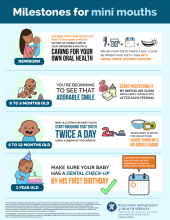
Protect Tiny Teeth, Milestones for Mini-Mouths: Infographic, P-90034a DHS publication, English-Spanish: Information on caring for a baby's mouth from newborn to age 1.
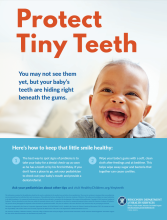
Protect Tiny Teeth: Poster, P-90034 DHS publication, English-Spanish: Poster illustrating the importance of caring for baby's gums.
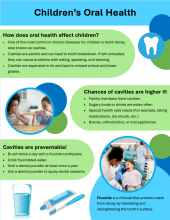
Children's Oral Health, P-44534 (PDF) DHS publication: Fact sheet explaining children's oral health and how parents can help children take care of their oral health.
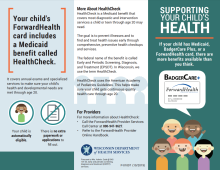
Medicaid HealthCheck Brochure, P-01007 (PDF) DHS publication: Brochure explaining a child's Medicaid benefit called HealthCheck.
Other resources
- Screening Resource Guide, P-00224 (PDF) DHS publication: Provides images of healthy teeth and oral lesions, tooth eruption chart, fluoride varnish facts, and oral health tips.
- Age 1 Dental Visit Children's Health Alliance of Wisconsin (CHAW) publication: Information on babies first dental visit.
- American Academy of Pediatrics: Oral Health American Academy of Pediatrics (AAP): Education, training, and advocacy for pediatricians, dentists, other health professionals, and families. Use the Oral Health Prevention Primer to help address oral health in practice.
- Children's Oral Health NIDCR, English-Spanish: Information on children's oral health topics. Download or order free printed copies of publications.
- Healthy Habits for Happy Smiles ECLKC, English-Spanish: Simple oral health tips for pregnant people and caregivers of infants and young children. Learn questions caregivers may ask about anesthesia or sedation used to treat a child's tooth decay and locate downloadable oral health resources for families.
- MouthHealthy ADA: Learn more about dental health topics A-Z, download how to brush patient education sheet, and share how to videos for brushing and flossing with patients.
- Nutrition Counseling for Obesity Prevention in Children: A Handbook for the Dental Community Temple University Maurice H. Kornberg School of Dentistry publication: Evidence-based resource for practicing dental professionals, oral health-related organizations, community health centers with dental clinics, and other academic programs interested in playing a role in childhood obesity prevention and comprehensive efforts to raise healthy, smiling children.
- Oral Health for Children CDC: Learn more about tooth decay and what can be done to prevent it.
- Smiles for Life Oral Health Smiles for Life, English- Spanish: A national oral health curriculum. Download patient tools and resources and patient education posters in multiple languages.
Get free help to quit commercial tobacco and nicotine
Wisconsin Tobacco Quit Line
Customized plans and coaching
Ages 13+
800-Quit-Now
Text "READY" to 34191
WI Tobacco Quit Line website
Live Vape Free
Text support to quit e-cigarettes
Ages 13-26
Text "VAPEFREE" to 873373
Live Vape Free website
American Indian Quit Line
Culturally tailored coaching
Ages 18+
888-7Ai-Quit
American Indian Quit Line website
First Breath
Support during and after pregnancy
Ages 18+
First Breath website
- First Breath Wisconsin Women's Health Foundation: Wisconsin’s free program to help people make positive changes to their commercial tobacco, alcohol and substance use during pregnancy & beyond.
- Medicaid/BadgerCare and Quitting Tobacco Fact Sheets University of Wisconsin Center for Tobacco Research and Intervention (UW-CTRI): Medicaid/BadgerCare coverage for tobacco-dependence treatment applies to treatment provided by any Medicaid-certified Wisconsin physician, nurse practitioner or physician assistant. Visit link to learn more.
- Tobacco is Changing DHS: Information on how commercial Tobacco is Changing, identifying new products, understand marketing tactics, tobacco data and how to talk to kids about commercial tobacco.
- Tobacco Fact Sheets University of Wisconsin Center for Tobacco Research and Intervention (UW-CTRI), English-Hmong-Spanish: Comprehensive list of free materials to be reprinted and distributed by health care professionals and others.
- UW-CTRI Treatment by Specialty UW-CTRI: Tobacco treatment resources for dentists and dental hygienists including trainings, toolkits, videos, and fact sheets.
- Wisconsin Tobacco Quit Line UW-CTRI: The Wisconsin Tobacco Quit Line is a free service to help people quit smoking, vaping, or other commercial tobacco use. Free 24/7 to any Wisconsin resident who is at least 13 years old. Call 1-800-Quit-Now or Text "READY" to 34191.
- American Indian Quit Line Offers free, culturally tailored support to help indigenous people aged 18+ to quit commercial tobacco— Call 1-888-7Ai-Quit. Download and print American Indian Quit Line Poster.
- Live Vape Free is a program that provides free support to teens looking to quit e-cigarettes— Text "VAPEFREE" to 873373. Download and print Live Vape Free- Teen Poster.
- Live Vape Free Educational Program DHS redirect: Parents, guardians or other adults who want to help a teen in their life quit e-cigarettes can start the Live Vape Free online course and receive tools to help them support the teen in their life through their quit journey. Download and print Live Vape Free- Adult Poster.
- Smoking and Tobacco Use CDC, English-Spanish: Links to clinician resources and information created and maintained by other public, private, and international organizations.
- TERL Tobacco Education Resource Library: Information focused on public health education, smoking cessation, tobacco research, retailer information, tobacco regulations, and compliance—all in one place.
- Implementing & Fostering QuitLine Referrals: A Guide for Oral Health Professionals ADA publication: A toolkit that offers dentists guidance on managing and how to refer patients to State QuitLines to support tobacco and vaping cessation efforts.
Community Water Fluoridation and Fluoride DHS: Important topics for both Health Care Professionals and Water Operators.
Find accurate information on the mineral fluoride and community water fluoridation, including resources for communicating with the general public on these important topics.
- Environmental Public Health Tracking System: Oral Health DHS: Public health professionals track oral health data in order to educate their communities and plan prevention efforts. This page is for data users of the Wisconsin Environmental Public Health Tracking data portal.
- Oral Health Program: Data and Reports DHS: Provides timely and accurate data on oral disease burden, prevention and risk behaviors, access, and workforce in Wisconsin. These data are essential to the development of public health programs that directly improve the oral health of all Wisconsinites. Review Wisconsin reports and briefings and explore interactive data dashboards.
- National Oral Health Surveillance System National Oral Health Surveillance System (NOHSS): Collaborative effort between CDC’s Division of Oral Health and the Association of State and Territorial Dental Directors (ASTDD). NOHSS monitors the burden of oral disease, use of the oral health care delivery system, and the status of community water fluoridation on state and national levels. Data for NOHSS indicators are updated in the CDC Oral Health Data webpage as new data become available.
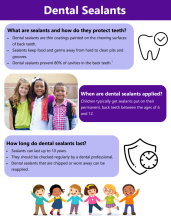
Dental Sealants, P-40110 (PDF) DHS publication: Explains dental sealants, their role in preventing tooth decay, and how a school-based oral health program is helping students in Wisconsin.
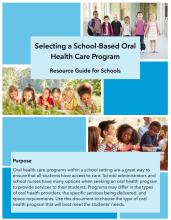
Selecting a School-Based Oral Health Care Program, P-00437 (PDF) DHS publication: Assists school staff in selecting a school-based oral health care program.
Other resources
- Wisconsin Seal-A-Smile DHS, English-Spanish: Information on Wisconsin Seal-A-Smile (SAS) local school-based oral health programs that provide preventive dental care to children in schools across Wisconsin.
- Dental Sealants: A Resource Guide National Maternal and Child Oral Health Resource Center (OHRC): Information on policy, practice guidance, professional education and training, public education, and state and local programs to help promote the use of dental sealants. Visit Seal America: The Prevention Invention for information on launching, improving, and sustaining school-based dental sealant programs and addressing issues related to referring students with unmet oral health needs to a dental clinic or office.
- Pew Charitable Trusts Report on Dental Sealants Pew Charitable Trusts: Pew's 50-state report focuses on prevention, examining states' efforts to improve access to sealants for low-income kids. Download Wisconsin's report (PDF) on progress.
Wisconsin DHS dental health care professionals follow CDC Infection Prevention and Control in Dental Settings evidence-based guidelines
- Access infection prevention and control resources and learn about free, non-regulatory support offered by the DHS Healthcare-Associated Infections Prevention Program on the Infection Prevention in Oral Health Settings webpage.
- CDC offers best practices for dental infection prevention and control in all dental settings including adjustments initiated during the COVID-19 pandemic.
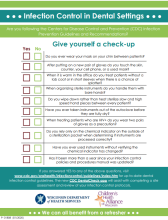
Infection Control in Dental Settings, P-01808 (PDF)
DHS publication: Checklist serves as a reminder of the CDC Infection Prevention Guidelines and Recommendations for Dental Settings, and provides links to the guidelines and CDC DentalCheck App.
Other resources
- Boil Water Advisory Toolkit-OSAP Organization for Safety, Asepsis and Prevention (OSAP): Safe drinking water in dental offices toolkit with regulations and guidelines, best practices, instructional and patient resources. Download the Boil Water-Dental Office Guidance quick reference.
- Basic Expectations for Safe Care Modules CDC training: 10 modules can be used to educate and train infection prevention coordinators, educators, consultants, and other dental health care personnel on seven elements of standard precautions, dental unit water quality, and program evaluation.
- Foundations: Building the Safest Dental Visit CDC training - three CE credits: Web-based, interactive, self-paced training provides an overview of the basic expectations for safe care—the principles of infection prevention and control that form the basis for CDC recommendations for dental healthcare settings. Training videos, explain the fundamentals of infection prevention and control, donning and doffing personal protective equipment, and instrument reprocessing. Follow the OHP's instructions to learn how to enroll in the Foundations training and help the OHP track completion.
Find guidance for Wisconsin oral health care professionals on licensing rules and regulations. Scroll down to the regulations and guidance section to learn more about:
- Changes to Wis. Admin. Code.
- Dental Hygienist and Dentist licensing requirements and renewal, practice settings, supervision, limitations, career options, and professional organization support.
- Dentist licensing requirements and renewal, practice settings, vaccine administration and limitations, and professional organization support.
- Medicaid/BadgerCare Plus provider enrollment, revalidation, billing, and resources.
- Mobile dentistry, including requirements and registration.
- Regulations and guidance for dental radiography.
- Department of Safety and Professional Services links.
Visit the Medicaid and BadgerCare Plus for Dental Providers webpage to learn more about Medicaid enrollment, billing, trainings, and resources.
UW Addiction Consultation Provider Hotline DHS and UW Department of Family Medicine and Community Health: The UW Addiction Consultation Provider Hotline offers on-call help to health care providers seeking support and direction in treating their patients’ substance use problems. Hotline available weekdays from 8 a.m. to 5 p.m.
Madison area providers call: 608-263-3260
Statewide providers call: 1-800-472-0111
When making a call please request to speak with the addiction medicine provider on-call. All calls are returned within 15 minutes.
- First Breath Wisconsin Women's Health Foundation: Wisconsin’s free program to help people make positive changes to their commercial tobacco, alcohol and substance use during pregnancy & beyond.
- Dose of Reality: Resources for Professionals DHS: Information on Wisconsin's Opioid Epidemic and on topics such as prevention, getting help now, data and additional resources for professionals.
- Oral Health Program: Opioids and Substance Use Disorders DHS: Information for oral health professionals providing services that respect the health and dignity of people who use alcohol, opioids, tobacco, and other substances. Wisconsin's Oral Health Program understands that all people have unique needs. Find information on knowing what to say, how to prescribe, or where to find support when needed. Locate free CE opportunities for oral health professionals licensed in Wisconsin.
- Substance Use: Partner/Provider Services DHS: Webpage for health care professionals who provide substance use services and are seeking support and direction to treat patients with substance use issues. Find information on hotlines, data, rules and regulations and professional training opportunities.
- Wisconsin Dental Pain Protocol (WDPP), WDPP: Systemic approach implemented by Emergency Departments (ED), Urgent Care Centers (UCC), dentists and community partners to reduce opioid use for patients presenting with non-traumatic dental pain.
- Wisconsin Dentistry Examining Board Best Practices for Prescribing Controlled Substances Guidelines Wisconsin Department of Safety and Professional Services (DSPS) publication: Wisconsin Dentistry Examining Board's legal guidance to dentists for prescribing controlled substances.
- Acetaminophen and NSAIDs Reference Sheet - Dentistry Michigan OPEN publication: Reference chart for managing dental pain with Acetaminophen and NSAIDs.
- Opioids and Children and Adolescents: Information for Oral Health Professionals OHRC publication: Describes recent research and best practices for pain management in children and adolescents and where to find more evidence-based resources.
- Prescribing Opioids for Women of Reproductive Age: Information for Dentists OHRC publication: Describes best practices for pain management in pregnant women, guidelines for prescribing opioids and description of neonatal opioid withdrawal syndrome.
- Screening for Substance Use in the Dental Setting NIH, English-Spanish: Information on screening patients and clinical management of patients with substance use disorders to help increase dentists awareness, comfort discussing pain, and knowledge of this subject.
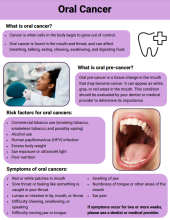
DHS publication: Fact sheet explaining oral cancer, its connection to oral health, symptoms, causes, prevention and Wisconsin facts.
Other resources
- Human Papillomavirus (HPV) Vaccine and HPV-Related Cancers DHS: Learn about HPV vaccine and health care professionals resources.
- Wisconsin Cancer Collaborative (WCC), WCC: Public, private, and community organizations work together to network, learn facts and figures, and share resources as they work to reduce the oral cancer burden in Wisconsin.
- HPV-Related Cancers and Vaccination Coverage in Wisconsin explains, in Wisconsin the most common cancer caused by HPV is oropharyngeal cancer. HPV vaccine safely and effectively prevents cancer, however, the majority of Wisconsin children are not completing their HPV vaccination series. Learn the impacts of COVID-19 and action steps for improving vaccination rates and saving lives. Cancer organizations network, learn facts and figures, and share resources as they work to reduce the oral cancer burden in Wisconsin.
- Learn more about oral health topics through issue briefs, discover infographics available in several languages, and Download how-to-sheets to share with patients.
- Detecting Oral Cancer: A Guide for Healthcare Professionals NIDCR: Poster with full-color photographs depicting each stage of the oral cancer examination. Find information to share with patients on oral cancer topics. Download or order free printed copies of publications.
- Head and Neck Cancers—Health Professional Version National Cancer Institute: Information on screening for head and neck cancers, their causes, symptoms, and treatments. Learn more about current statistics and research.
- HPV Toolkit for Dental Professionals Team Maureen and Massachusetts Coalition for HPV-related Cancer Awareness: Download HPV toolkit containing educational materials and resources that can be reproduced and distributed.
- Human Papillomavirus (HPV) and Oropharyngeal Cancer CDC, English-Spanish: Information on HPV and oropharyngeal cancer.
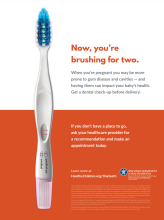
Brushing for Two: Poster, P-90033 DHS publication, English-Spanish: Reminds pregnant people to get a dental check-up before delivery.
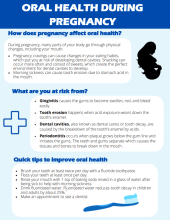
Oral Health During Pregnancy, P-00137 (PDF) DHS publication: Learn how oral health changes during pregnancy, understand why oral health matters, and find tips to keep a pregnant person and their baby healthy.
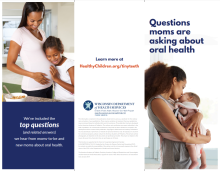
Provider Guide: Questions Moms are Asking About Oral Health, P-90032 DHS publication, English-Spanish: Trifold brochure answers questions about oral health during pregnancy and caring for an infant's mouth.
Other resources
- First Breath Wisconsin Women's Health Foundation: Wisconsin’s free program to help people make positive changes to their commercial tobacco, alcohol and substance use during pregnancy & beyond.
- Oral Health Campaign Toolkit AAP: Customizable materials for patient outreach and education around oral health as well as clinical resources to help integrate oral health into practice. Providers find conversation tactics for talking with patients about the safety and importance of dental care during pregnancy, healthy tips, and more.
Dental hygienist career opportunities
The Wisconsin Oral Health Program partnered with dental hygienists on a webinar series offering a glimpse into career opportunities available to Licensed Dental Hygienists in Wisconsin. Each hygienist shares their unique story. You will know what inspires them; understand their passion for their work and the patients they serve; and will learn helpful information for anyone interested in a career in similar practice settings.
- Dental Hygiene in Wisconsin DHS: Is the best place to start if you are exploring dental career options or have a dental hygiene license from another state and want to practice in WI. Learn about education, WI licensing, scope of practice, supervision, compensation and more.
- Dental Hygiene in Wisconsin: Local Health Department DHS: Provides an opportunity to understand public health hygienists and their varying roles. Public health hygienists may interact with patients in a school, senior center, or other community location. They help patients get dental care and may even learn expanded skills like teaching CPR, planning for emergencies, and responding to the community’s unique needs.
- Hygienists in Medical Dental Integration DHS: Reminds us that oral health is part of overall health. Not all patients see a dentist first. What happens when patients arrive for a medical visit with dental problems? Hygienists in medical settings often educate pregnant moms, see children during well child visits, and consult with urgent care doctors on dental related concerns. Having a dental hygienist in the medical office can streamline care, help reduce emergency department visits related to tooth or mouth pain and impact overall health outcomes.
- Oh, Get a Job, Already! What is dental hygiene? DHS: Direct access dental hygienist, JenJen Reed, shares how mentors helped spark and encourage her dream career. As a first-generation Asian American she faced many barriers. By allowing her passion to lead, she became the first of her generation to start her own hygiene business serving medically compromised adults in Wisconsin nursing homes.
- Wi RDH: School-Based Setting DHS: Teaches the value of dental hygienists in school-based settings. Many children have trouble accessing dental care but, bringing dental services into schools can help. Since all programs differ, networking with others in your community is key to strengthening each one and helping more children. Learn tips for getting started, realistic timelines, best practices and understand unique considerations for business ownership.
- WI Dental Hygienist in a Federally Qualified Healthcare Center DHS: offers insight into an amazing life and career journey as it overlaps to cross oceans, remove language and cultural barriers, and find solid footing as part of a comprehensive team addressing a variety of healthcare needs for patients. Learn that opportunities for dental hygienists seem endless. They can work in a dental office, mobile dentistry program, be a language translator or even help a single mom receive life-saving cancer treatment. Sometimes, it is all part of an overlapping journey that fills one’s heart to overflowing.
- Nonprofit Dental Clinic Learning Sessions with D4 Practice Solutions DHS: The Wisconsin Oral Health Program partnered with D4 Practice Solutions to create a training series on dental clinic operation and management for safety net dental clinics. Available trainings include:
- A Practical Approach for Oral Health Integration
- Basics of Dental Practice Transformation
- Creating the Plan for Dental Program Sustainability
- Managing for Success—Safety Net Dental Programs
- Managing Quality When Time and Resources are Scarce
- Practical Applications of TeleDentistry
- Program Evaluation for Dental Programs
- Work Hard Get Paid
- Workforce DHS: Wisconsin oral health workforce information on licensing rules and regulations for providers, changes to Wis. Admin. Code, Medicaid/BadgerCare Plus provider enrollment, revalidation, billing, and resources; and mobile dentistry requirements.
- The Ins, Outs and In-Between: How Dental Medicaid Works and How It Can Work for You ADA training- 1 CE credit: Dental Medicaid benefits can be a confusing process, but that doesn’t mean your bottom line can’t benefit from participation. Being a Medicaid provider – even for a few patients per week – can enhance your community stature, increase legislative effectiveness, and help the dental profession. Learn more about how it works (and can work for you) from dentists who take Medicaid in their practices, with concrete tips based on their own personal experiences including appropriate documentation, patient management and a journey into cultural competence that will elevate your entire practice.
Not finding what you need?
Reach out to the Oral Health Program. Contact us and Sign Up for Oral Health Program updates.
